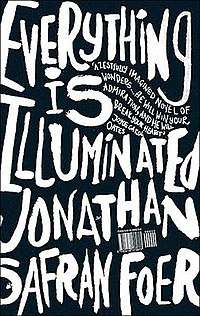Everything Is Illuminated
 Front cover of hardcover edition. | |
| Author | Jonathan Safran Foer |
|---|---|
| Cover artist | Jon Gray (aka gray318) |
| Country | United States |
| Language | English |
| Genre | Novel |
| Publisher | Houghton Mifflin |
Publication date | April 16, 2002 |
| Media type | Print (hardback & paperback) |
| ISBN | 0-618-17387-0 (hardcover) |
| OCLC | 48144414 |
| 813/.6 21 | |
| LC Class | PS3606.O38 E84 2002 |
Everything Is Illuminated is the first novel by the American writer Jonathan Safran Foer, published in 2002. It was adapted into a film of the same name starring Elijah Wood and Eugene Hütz in 2005.
The book's writing and structure received critical acclaim for the manner in which it switches between two stories, both of which are autobiographical. One of them is the fictionalized history of the eradicated town of Trochenbrod (Trachimbrod), a real exclusively Jewish shtetl in Poland before the Holocaust where the author's mother was born; while the second narrative encompasses Foer's trip to Ukraine in search for the remnants and memories of Trachimbrod as well as the author's writing-in-progress.
Historical background
The real town of Trochenbrod (Polish: Zofiówka) was an exclusively Jewish shtetl located in the Wołyń Voivodeship of the Second Polish Republic before the Nazi-Soviet invasion of Poland.[1] After the German attack on the Soviet positions in eastern Poland during the 1941 Operation Barbarossa, a Jewish ghetto was established at Trochenbrod for local residents including those from nearby villages. The ghetto was liquidated during the Holocaust. In August and September 1942 nearly all Jews of Trochenbrod were murdered by the Ukrainian Auxiliary Police in the presence of only a few German SS men. According to Virtual Shtetl over 5,000 Jews were massacred, 3,500 of them from Zofiówka and 1,200 from nearby Lozisht (Ignatówka) among other settlements.[2][3]
Plot summary
Jonathan Safran Foer (the author), a young American Jew and avid collector of his family's heritage, journeys to Ukraine in search of Augustine, the woman who saved his grandfather's life during the Nazi liquidation of Trachimbrod, his family shtetl (a small town) in occupied eastern Poland. Armed with maps, cigarettes and many copies of an old photograph of Augustine and his grandfather, Jonathan begins his search with the help from Ukrainian native and soon-to-be good friend, Alexander "Alex" Perchov, who is Foer's age and very fond of American pop culture, albeit culture that is already out of date in the United States. Alexander studied English at his university, and even though his knowledge of the language is not "first-rate", he becomes Foer's translator. Alex's "blind" grandfather and his "deranged seeing-eye bitch," Sammy Davis, Jr., Jr., accompany them on their journey.
Literary significance and criticism
Upon its initial release the book received enthusiastic reviews, particularly in The Times, which stated that Foer had "staked his claim for literary greatness."[4] However, Canadian Ukrainian commentator Ivan Katchanovski in his article from The Prague Post online lamented that the book misrepresents the history of Jews in Ukraine and that the factual history of the massacre at Trachimbrod "stands in a sharp contrast to claims made in the book."[5]
Awards and honors
- 2001 National Jewish Book Award, winner
- 2002 Guardian First Book Award, winner
- 2002 New York Times Bestseller
- 2002 Amazon.com Best Books
- 2003 Young Lions Fiction Award, winner
- 2003 William Saroyan International Prize for Writing, winner
- 2004 PEN/Robert W. Bingham Prize, co-winner
- 2007 Pajiba's Best Books of the Generation (Readers' List), no.8.[6]
References
- ↑ Eleazar Barco (Bork) (April 22, 1999) [Written before World War Two]. "Trochinbrod - Zofiowka". Translated from Hebrew by Karen Engel. Transcribed by Gary Sokolow (tripod.com, Internet Archive). Archived from the original on March 2, 2014. Retrieved 24 December 2014.
- ↑ Beit Tal (2010). "Zofiówka". POLIN Museum of the History of Polish Jews. Retrieved 25 December 2014.
- ↑ Beit Tal (2014). "Truchenbrod – Lozisht". The Nahum Goldmann Museum of the Jewish Diaspora. Archived from the original on 10 August 2014. Retrieved 25 December 2014.
- ↑ "Luminous talent in the spotlight". London: The Times. July 7, 2002. Retrieved July 12, 2007. (access blocked with demand for personal info)
- ↑ Katchanovski, Ivan. (October 7, 2004) "Not Everything Is Illuminated". The Prague Post. Accessed November 20, 2010.
- ↑ Pajiba presents The Generation’s Best Books as defined by our readers. June 20, 2007, Internet Archive.